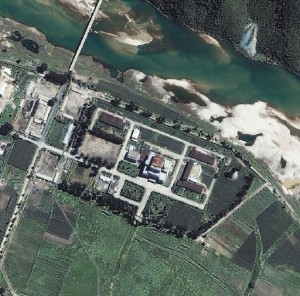- California Assembly OKs highest minimum wage in nation
- S. Korea unveils first graphic cigarette warnings
- US joins with South Korea, Japan in bid to deter North Korea
- LPGA golfer Chun In-gee finally back in action
- S. Korea won’t be top seed in final World Cup qualification round
- US men’s soccer misses 2nd straight Olympics
- US back on track in qualifying with 4-0 win over Guatemala
- High-intensity workout injuries spawn cottage industry
- CDC expands range of Zika mosquitoes into parts of Northeast
- Who knew? ‘The Walking Dead’ is helping families connect
US believes N. Korea has secret nuclear facilities

This satellite image provided by Space Imaging Asia shows the Yongbyon Nuclear Center, located north of Pyongyang, North Korea. (AP Photo/Space Imaging Asia)
WASHINGTON/SEOUL, June 8 (Yonhap) — North Korea is believed to have secret nuclear facilities unknown to the outside world in addition to those at the country’s main Yongbyon nuclear complex, the State Department said in a report.
The department’s 2015 Report on Adherence to and Compliance With Arms Control, Nonproliferation, and Disarmament Agreements and Commitments also said that Pyongyang appears to have no intention to comply with its denuclearization commitments.
The Yongbyon complex houses the North’s 5-megawatt reactor and other facilities that have provided the communist regime with weapons-grade plutonium, with which the regime has conducted three nuclear tests in 2006, 2009 and 2013.
The North also has a light water reactor under construction and uranium enrichment facilities at the complex that could provide the country with a second source of fissile material that can be used in building nuclear bombs.
In addition to these facilities at Yongbyon, the communist nation has long been suspected of running clandestine nuclear facilities in other parts of the country, such as additional uranium enrichment facilities.
“The United States believes there is a clear likelihood of additional unidentified nuclear facilities in the DPRK,” the State Department report said, referring to the North by its official name: Democratic People’s Republic of Korea.
The report also noted that the North restarted the 5-megawatt reactor in 2013 and that the light water reactor under construction could give the North “a justification to possess uranium enrichment technology that could potentially be used to produce fissile material for nuclear weapons.”
“The United States consistently urged North Korea to respond to diplomatic efforts to create the conditions necessary for the resumption of the six-party talks, premised on a demonstrated DPRK commitment to make meaningful progress toward denuclearization,” the report said.
“DPRK statements and activities during the reporting period did not signal any intention or commitment to denuclearization.”
Asked about its assessment, South Korea’s Ministry of National Defense said on Monday that the intelligence authorities of Seoul and Washington “have been closely tracking and watching the relevant development regarding North Korea’s nuclear tests.” It did not elaborate.
The communist country has conducted three known rounds of underground nuclear tests in 2006, 2009 and 2013, and has vowed to carry out “a new form” of test.















